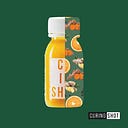Be organic!
Sustainability is very close to our hearts. That’s why we, the Curingshot team take special care to always keep our products at the best and most environmentally friendly level. That’s why we are happy to announce that our Curingshot is now officially certified as an organic product.
As more and more people become conscious of their diet, organic food is becoming increasingly popular. The first organic farms were established back in the early 20th century. Today, some 100 years later, the organic food industry, or as the German government called it in 2013, the “organic trend,” is experiencing a significant boom. But what exactly does “organic” actually mean? Why is the organic label important and do organic foods really taste better?
Today we have summarised all the answers to the most important questions about “organic”:
What is organic?
The term is defined by law in the EU. Organic products must come from ecologically controlled cultivation, may not be genetically modified and are grown without the use of synthetic chemical pesticides, artificial fertilisers or sewage sludge.
What requirements must organic products meet?
The aim of the organic label is to promote organic farming via clearly defined rules. Accordingly, 95 percent of the agricultural ingredients of an organic product must come from organic farming.
In addition, all products bearing the organic label must …
… not be produced by and with genetically modified organisms.
… not be produced with the use of synthetic pesticides.
… not be produced with the help of easily soluble mineral fertilisers.
… not contain flavour enhancers, artificial flavours, colorants and emulsifiers.
… contain only 49 additives during processing (By comparison, conventionally produced products typically use more than 200 additives).
Why is organic important?
Young mothers, for example, start eating organic when they start thinking about what to feed their baby. Others limit their “organic” consumption to milk alone because they want to advocate for fair pay for dairy farmers. But these are by no means all the reasons for choosing an organic diet. Because those who choose organic food make a significant contribution to supporting many other positive things with their purchasing behaviour. Compared to conventionally produced food, organic products have numerous advantages, including health, environmental and ethical:
More vitamins: Quite a few studies confirm that organically grown fruits contain far more antioxidants, vitamin C and polyphenols (phytonutrients) compared to those grown conventionally.
Environmental friendliness: the cultivation of organic food preserves groundwater, because synthetic fertilisers, which lead to increased nitrate levels, are not allowed here. In addition, any pesticide is prohibited. The absence of pesticides not only benefits the food, but also primarily the environment.
Quality control: The annual, intensive control of all production steps in the farms ensures the certainty of receiving high-quality and safe products with the organic food.
Climate protection: Organic food not only tastes better, it is also good for our climate, because its production generates fewer harmful greenhouse gases than the production of conventional food. The lower greenhouse gas emissions are due to the fact that organic fruit and vegetables are grown without the use of nitrogen fertilisers.
No genetic engineering: Less chemicals are also used in the cultivation of organic food. This is because producers are required by EC organic regulations to completely avoid the use of genetic engineering in all areas of organic food production.
Waste prevention: The organic seal also states that waste should be avoided as much as possible and that packaging should be kept as small as possible — if it is necessary at all!
Why do we do organic?
From the beginning, our vision has been to provide our customers with the best possible food quality. Because of our high standards, we therefore consider the step of using organic quality raw materials and thus enhancing the Curingshot, to be very important. Furthermore, we develop our recipes not only for taste but also for functionality, which is why the quality of each raw material is a significant part. We are also very concerned about protecting the environment from harmful pesticides.
Why is organic higher quality?
Higher nutritional value: Organic products have a higher nutritional value and yet leave a healthier soil with a diverse soil life. This is confirmed by a study that compared conventional farms with organic farms in terms of their soils and crops.
Longer shelf life: As mentioned earlier, organically grown fruits contain more antioxidants, vitamin C and polyphenols (phytonutrients). This also contributes to organic fruits having a longer shelf life and higher dry matter than conventional fruits.
More phytochemicals: Other studies have shown that foods produced according to organic standards contain more phytochemicals and flavours, but less water, making them healthier and of higher quality.
Why can flavour and color sometimes vary in organic foods?
All of Curingshot’s ingredients are all-natural. Despite identical proportions in the production of our organic product, there may be a slight variation in taste or color, as with each harvest the taste and color of the natural products used may vary.
How are the farms of the farmers controlled according to the organic guidelines?
According to the organic guidelines, all organic products are marked with a control number so that the production process can be better traced. In addition, all organic farmers are regularly visited by a control body. This ensures that the prescribed guidelines are also permanently adhered to, so that consumers can be assured of high-quality food when buying organic products.
As you can see, the term “organic” has many positive effects on the product, the consumer and the environment. Therefore, it has always been our goal to produce the Curingshot in organic quality. We hope to have answered all your questions about “organic” with this FAQ and are looking forward to your feedback.
See you next time,
Your Curingshot-Team
Sources:
https://www.bmel.de/DE/Landwirtschaft/Nachhaltige-Landnutzung/Oekolandbau/_Texte/Bio-Siegel.html?nn=309814#Start
https://ec.europa.eu/info/food-farming-fisheries/farming/organic-farming_en
https://www.gesundheit.de/ernaehrung/alles-bio/biowissen/oeko-gut-alles-gut
https://www.zentrum-der-gesundheit.de/bio-lebensmittel-ia.html
